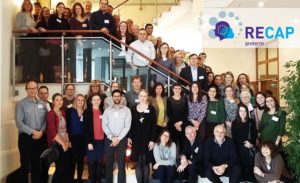RECAP preterm – Research on European Children and Adults born Preterm
Background: from data collection to data sharing
The overall aim of the EU-funded research project RECAP preterm is to improve health, development, and quality of life of children and adults born very preterm (VP) or with a very low birth weight (VLBW):
- VP: less than 32 weeks of gestation
- VLBW: less than 1500 g
The innovative element of RECAP preterm is to provide the bridge from data collection to data sharing: the members aim to establish a digital platform for harmonising and exploiting data of European cohort studies with babies, children, and adults born preterm as well as Nordic registry data. This broadened data basis shall ensure improved understanding, diagnosis and evidence-based, personalised prevention of mental and somatic disorders that are associated with preterm birth. Long term effects of different treatments, especially the use of (off-label) medication applied for these patients are meant to be analysed by combining adult cohorts with available data from preterm babies. By developing mHealth applications, the cohort participants shall be encouraged to sustainably collect follow-up data (mHealth/mobile health = the use of information and communication technology for collecting health data, delivery of healthcare information, monitoring of patient vital signs, and telemedicine).
RECAP Preterm Summer School
Discover the RECAP preterm digital Summer School from the comfort of your home!
The E-Learning programme will be online from 1 July 2021 and will give you insights into:
① very preterm cohorts and collaborative research principles and techniques
② new research on children and adults born very preterm based on pooled data
③ how to implement a collaborative research protocol – including the ethical and legal requirements, procedures for harmonising data, the technological aspects of storing and sharing data, and analytic approaches and software
Register today via https://recap-preterm.eu/ for the exclusive link to the modules
You want to learn more about RECAP preterm?
Check out the image video for an overview of the #RECAPpreterm project and the unique Cohort Platform that is currently being developed and that will be launched this coming autumn.
At the moment, there are already an impressive 25 individual studies, 74 collected datasets and 11,145 individual study variables available.
Core steps
RECAP preterm will…
- create a sustainable data platform of national and European cohorts of VP/VLBW children and adults to optimise the use of population data for research and innovation in healthcare and policy (view more)
- develop hypothesis-driven research on health status and medical care of VP/VLBW children and adults that builds on the unique opportunities provided by the larger sample sizes of combined cohorts and the added value of their geographic and temporal diversity
- integrate exchange with various stakeholders to disseminate results and to translate them into evidence-based care and policy (e.g. obstetricians, neonatologists, paediatricians, psychologists, psychiatrists, other healthcare providers, educators, scientists, economists, policy planners, health insurance companies, and patient and parent groups).
- emphasise patient and public involvement in order to reflect real-world needs
Members and Partners
The RECAP preterm consortium
RECAP preterm brings together European child to adult cohorts and a group of highly experienced organisations. The expertise of the partners covers a wide and complementary range of fields, including life course epidemiology, methodology, neonatology, paediatrics, early-life stressors, non-communicable disease research, epigenomics, economics, psychology, and mental health as well as e-learning technologies, eHealth/mHealth applications, communication, dissemination and project management.
Milestones by EFCNI
- EFCNI’s role in RECAP preterm lies particularly in leading all activities regarding dialogue, dissemination, and sustainability by reaching out to the scientific community, clinicians, healthcare professionals, patient organisations, the general public, policy makers, and other potential stakeholders at the national, European, and international level to increase the visibility as well as the health and societal impact of RECAP preterm. A particular focus will be placed on parents in the interaction and dissemination strategy in particular to identify and answer user-driven research questions and policy needs.
- By organising a workshop on “Translation of Research into Policy” EFCNI and all RECAP partners will reach out to the European policy level.
- We’ll also support our project partners to conduct a winter school with clinicians and researchers to promote the RECAP preterm platform and to train them on the evidence generated by the project.
Next steps
- Preparation for and organisation of the Summer School 2021
- New Social Media promotion, highlighting information about the project
- Preparing policy briefs for healthcare professionals and key stakeholders
- Verbalising the upcoming research findings in order to make them easier to understand for non-expert target groups like the general public or parents and patients
Links and Downloads
Have a look at the official project website to gain deep insights into the project.
Have a look at the project flyer to learn more about the aim and scope of RECAP preterm, its supporting partners, and the structure of the project.
Series about the RECAP preterm cohorts
In a year-round series, we reported about several cohorts of the RECAP preterm project. Read more about:
- Part 1: the ESTONIA I & II cohorts
- Part 2: the cohorts of the EPICure Studies in the United Kingdom and Ireland
- Part 3: the Project Extreme Prematurity (PEP) from Norway
- Part 4: the NTNU Low Birth Weight Life study from Norway
- Part 5: the Bavarian Longitudinal Study (BLS)/Bayerische Entwicklungsstudie (BEST)
- Part 6: the POPS (Project On Preterm and Small for gestational age infants) cohort from the Netherlands
- Part 7: the EPIBEL (Extremely Preterm Infants in Belgium) cohort from Belgium
- Part 8: the AYLS (Arvo Ylppö Longitudinal Study) cohort from Finland

Please note
This project has received funding from the European Union’s Horizon 2020 research and innovation programme under grant agreement No 733280.





